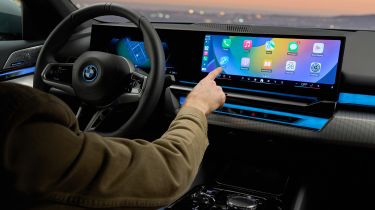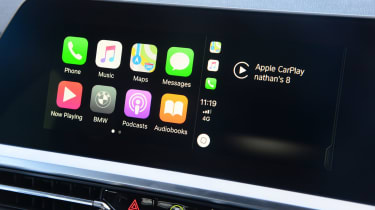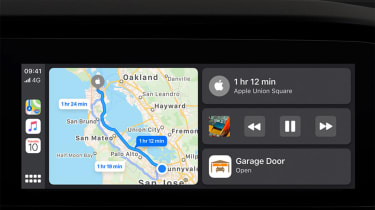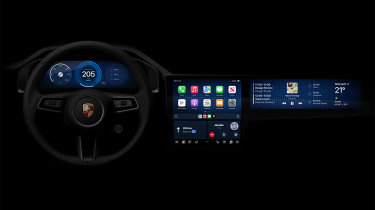What is Apple CarPlay? How it works and compatible cars
Want to connect your iPhone to your car? You’ll need Apple CarPlay – here’s how it works

Modern smartphones are packed with countless useful features, and Apple CarPlay is one of the most popular ways to access them safely while driving. Available exclusively for iPhone users, Apple CarPlay allows you to make calls, use navigation apps, reply to text messages and more, all from the driver’s seat.
Once connected to the car, Apple CarPlay will be displayed on the car’s in-built infotainment screen in an intuitive and safe-to-use layout, providing drivers with a way to use a selection of their iPhone’s apps on the move without breaking the law. The system has been around for over a decade and comes fitted to the majority of new cars, although sometimes as an optional extra. If you use an Android smartphone, you can enjoy a similar experience by connecting to your car’s infotainment display using Android Auto instead.
If you’re unsure how to use Apple CarPlay or want to know which cars come fitted with it, our complete guide explains all…
What is Apple CarPlay?
Apple CarPlay is a system that lets you use some of your iPhones features through your car’s in-built infotainment screen. It’s not a complete one-to-one mirror of your iPhone, but it displays certain features that are useful for driving, including music, navigation and calls.
You simply connect your iPhone, and a simplified app layout is displayed on your infotainment screen, essentially overriding your car’s in-built software. But why would drivers prefer to use CarPlay over their car’s in-built infotainment system?
It comes down to personal preference. Those who are familiar with using an iPhone may find CarPlay a more intuitive interface than the car’s built-in infotainment system. With its recognisable app icons and clear layout, it can often be easier to navigate than the car’s unique user interface.

What apps does Apple CarPlay have?
The other major advantage is apps. Drivers can choose from a range of navigation apps, including Apple Maps, Google Maps and Waze, instead of the car’s native sat-nav. These can provide a slicker user experience and allow you to continue using navigation on foot once you reach your destination.
Apple Maps is the default navigation app for iPhones and brings lots of other clever features, including the ability to send an estimated time of arrival to one of your contacts. Apple Maps also allows EV drivers to find charging stations easily. It can provide real-time availability of chargers and charging networks that are suitable for your vehicle, making it easier to see which charging stations along your route would be suitable for a charging stop.
Your iPhone’s music apps, such as Spotify and Apple Music, are available through CarPlay, too. You can play any music downloaded to your iPhone, or stream playlists, podcasts and audiobooks as long as you have a data connection. However, in most cases, you won’t be able to use your car’s radio while CarPlay is running – you’ll have to do that through a CarPlay app like Apple Music instead.
Of course, you can use your iPhone’s call functionality through CarPlay, and it can read incoming iMessage and WhatsApp messages to you. You can reply using Apple’s voice-activated assistant, Siri, by simply asking it to compose a new message. Other features include news updates and calendar reminders, while apps like Zoom can let you drop into work calls while on the move.

Understandably, not all apps are compatible, so you won’t be able to play games or watch movies on the move (nor should you – it’d be very dangerous), but Apple’s app templates are encouraging more developers to create their own Apple CarPlay compatible apps.
All of this functionality runs on the iPhone itself, not the car’s in-built computer. As the latest iPhones are so fast and powerful, you often end up with a slicker and snappier experience using Apple CarPlay versus the in-built infotainment software.
A further benefit over in-built infotainment systems is that Apple makes sure to frequently update CarPlay with new improvements and bug fixes. This is done over-the-air through your iPhone. Previous updates include the ability to unlock and start some car models with just your iPhone, as well as a ‘Drive focus’ mode that will only allow important notifications to come through while you’re driving.
How do I connect to Apple CarPlay?
Start by connecting your iPhone to your car using its USB charging cable, or via Bluetooth if your car has wireless CarPlay functionality. Regardless of which connection option you pick, connecting to CarPlay will make your car’s infotainment screen look like a zoomed-in version of your iPhone screen. It’s important to note that you need version 7.1 or later of Apple’s iOS operating system on your phone for a connection to be recognised.
Wireless CarPlay adapters are available for cars where you’d have to plug your phone in. These range in price, with many coming in at under £50. You plug the adapter into your car’s USB slot, rather than the phone cable.
How do I use Apple CarPlay?
You can use CarPlay in a few different ways. The primary method for operating CarPlay is through your car’s touchscreen. You select apps by pressing on the icon, much like you would on your iPhone. If your car doesn’t have a touchscreen, then you can use the rotary selector, trackpad or steering wheel buttons instead.
Alternatively, you can make use of the Siri voice control function to operate most of the apps without having to take your hands off the wheel. It can open apps, play music, set navigation destinations and plenty more.
Which cars have Apple CarPlay?
You’re likely to find CarPlay in most new cars, albeit as an optional extra in some models. Our in-depth reviews will usually mention whether a new car comes with Apple CarPlay (or Android Auto), so head to the review of the model you’re interested in to find out.
Although Apple claims there are over 800 different car models with CarPlay compatibility, it doesn’t appear in every new car. It’s notably absent from all Tesla models, with the American brand preferring drivers to use its own infotainment system.
It’s also worth bearing in mind that some of Apple CarPlay’s more complex functionality depends on the hardware your car comes with – if your car doesn’t have the tech to unlock the doors with an iPhone, for example, even a software update won’t change this.
If your car doesn’t have Apple CarPlay, it is possible to retrofit an aftermarket infotainment system that includes the software.
What’s next for Apple CarPlay?
Apple presented its next-generation Apple Carplay system in 2022, promising more functionality than ever before. It’s expected to arrive in 2024, with an overhauled user interface that will extend to all of the car’s interior displays, not just the infotainment screen.

That would allow CarPlay to run on a digital driver’s display, or a separate passenger display, alongside the central infotainment screen, creating one integrated system throughout the car. There will be new widgets to choose from – much like the one’s on your iPhone’s home screen – providing more information across the car’s dashboard. Drivers will also be able to customise the appearance of their gauge cluster by choosing between different designs of digital rev counter and speedometer.
Advantages of Apple CarPlay
CarPlay isn’t short on benefits, and many have already been discussed in this guide. As a short overview, here are some of our biggest advantages:
- Apple CarPlay is easy to use, especially if you’re already familiar with an iPhone
- Apple CarPlay is free to use for iPhone users and is usually fitted to new cars at no extra cost
- Apple CarPlay lets you use the map or music app that you prefer
- Apple CarPlay combines most of your driving-related applications in one easy-to-use interface
- Apple CarPlay is often snappier than a car’s in-built infotainment system and receives regular updates
Disadvantages of Apple CarPlay
Though there are many advantages to Apple CarPlay, there are a few disadvantages that drivers should be aware of:
- Apple CarPlay is not yet available on all cars
- Apple CarPlay could be an expensive optional extra
- Apple CarPlay has not yet been offered in every country
- Apple CarPlay may still be missing accessibility to certain apps that you, specifically, may find integral on a day-to-day basis
- Apple CarPlay could be a big distraction to some drivers
- Once Apple CarPlay is running, you won’t be able to access certain features and settings in your car’s native infotainment system without leaving CarPlay first – it’s not impossible, just a bit fiddly.
Should I get Apple CarPlay?
The key details point strongly in favour of Apple CarPlay, and with time, we’re likely to see it implemented as a standard feature for every new car. Once the screen comes up, you’re able to use the various apps just like you would on your iPhone, but as the display is bigger and clearer, it’s much safer than fumbling about with your phone while on the move. We think it’s a worthwhile feature to have, so we recommend shopping for a car with Apple CarPlay if you use an iPhone. Android users have their own alternative called Android Auto which is equally useful – this is often fitted to new cars at no added cost, too.
Frequently Asked Questions
Check out our guide to the best free driving apps and the best paid and free sat-nav apps for your phone
Recommended

Classic car tax exemption: which historic vehicles qualify?
Most Popular
Tips & advice

Car dashboard warning lights: what does each symbol mean?

Electric car charging stations: public networks, charger types, apps and maps








